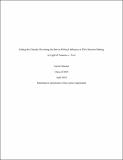| dc.contributor.advisor | Peter Hutt | en_US |
| dc.contributor.author | Shachar, Carmel | |
| dc.date.accessioned | 2012-06-03T02:38:16Z | |
| dc.date.issued | 2010 | |
| dc.identifier.citation | Carmel Shachar, Ending the Charade: Revisiting the Ban on Political Influence in FDA Decision Making in Light of Tummino v. Torti (April 2010). | en_US |
| dc.identifier.uri | http://nrs.harvard.edu/urn-3:HUL.InstRepos:8822168 | |
| dc.description.abstract | The wide scope of discovery and judicial review in Tummino v. Torti is directly traced to the prohibition against political motivations in agency decision-making. The FDA in evaluating the OTC switch application for Plan B was most likely influenced by the Bush White House political agenda. As the case law stands, Tummino was decided correctly because political influence in agency decision-making is seen as bad faith and not as sufficient rationale for decisions. However, within in the past thirty years Presidents have become successfully increasingly aggressive about use administrative agencies such as the FDA to accomplish their political agendas. As this trend seems unlikely to dissipate any time soon, a better judicial approach would be to allow agencies to admit to political influences in their decision-making. This would then allow judges to determine if the political influence was permissible or if it prevented the agency from accomplishing its mandate. Furthermore, it would reduce temptation to manipulate the scientific record to support agency conclusions when those conclusions were actually based on policy judgments. | en_US |
| dash.license | LAA | |
| dc.subject | General Background>>The Philosophy of Regulation | en_US |
| dc.subject.other | Food and Drug Law | en_US |
| dc.title | Ending the Charade: Revisiting the Ban on Political Influence in FDA Decision Making in Light of Tummino v. Torti | en_US |
| dc.type | Paper (for course/seminar/workshop) | en_US |
| dc.date.available | 2012-06-03T02:38:16Z | |


